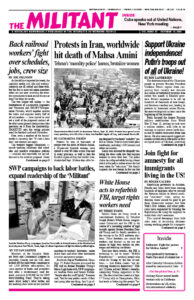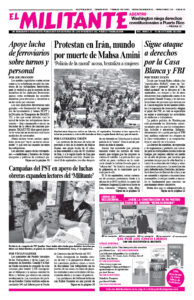NEW YORK — Cuban Foreign Minister Bruno Rodríguez Parrilla spoke at the United Nations General Assembly Sept. 21, condemning the “ruthless and unilateral economic, commercial and financial blockade” of his country imposed by the United States government for more than 60 years.
Rodríguez and Deputy Foreign Minister Carlos Fernández de Cossío were in New York for the annual opening of the assembly. Rodríguez also participated in a public meeting of some 400 people at Riverside Church Sept. 24. Cossío was interviewed by Amy Goodman and Nermeen Shaikh on the radio show “Democracy Now” Sept. 22.
The goal of U.S. policy against Cuba is to “generate material shortages, scarcity, and suffering” in order to “sow discouragement, dissatisfaction and cause damage to the Cuban people” and their socialist revolution, Rodríguez said at the General Assembly. He explained that Washington pressures other governments, banks and companies not to do business with Cuba to prevent any flow of foreign currency into the country. They want to “provoke economic collapse.”
In response to a question by Shaikh about the effects of the embargo, Fernández de Cossío emphasized, “The aim of U.S. policy since 1960 has been to make life as difficult and as unbearable as possible for the people of Cuba, with the ambition that that would lead to the overthrow of the government.”
“The United States cannot accept … a government in this region that is not subject to the demands of corporate interests, whose government cannot be bought with money, where politicians respond to the people and not to who pays the most, where we can carry our social health, educational, housing policies without having to ask the permission of the International Monetary Fund,” he added.
On Nov. 2-3 the U.N. will hold a debate and vote on a motion demanding Washington end its economic, commercial and financial embargo against Cuba. A similar motion introduced last year passed 184-2. This year will mark the 30th time the U.N. has passed such a demand on the U.S.
The administration of President Joseph Biden maintains the highly aggressive sanctions imposed against Cuba by the former administration of Donald Trump, Rodríguez emphasized.
The decision just that morning by the White House to increase staff at its Havana Embassy to begin processing full immigrant visas in early 2023 “is a positive step,” the foreign minister said. This makes it easier for Cubans to reunite with family members in the United States.
“The human damage [U.S.] policy generates for all Cuban families,” Rodríguez said, “is enormous, cruel and immoral.”
“Despite the enormous challenges,” Rodríguez said, “we defeated COVID-19 with our own resources, vaccines and the strength of our public health and science system.” Cuba is using three vaccines developed within the country. It has the highest vaccination rate in the world and was the first to develop vaccinations for children as young as 2 years old. “At the worst moments of the pandemic we sent 58 medical brigades to 42 countries and territories,” he said.
Both Rodríguez and Fernández de Cossío addressed the war in Ukraine. “There’s a huge responsibility of the U.S. government pushing NATO in an aggressive position against Russia,” Fernández de Cossío told Shaikh. “At the same time, Cuba cannot support and does not support the transgression of the sovereign borders or the sovereignty and territory of any country.”
Rodríguez also reiterated Cuba’s commitment “to self-determination and independence of the people of Puerto Rico.”
At the Riverside Church program, organized by The People’s Summit, Rodríguez was joined on the panel by Venezuelan Foreign Minister Carlos Faría; Kristin Richardson Jordan, a member of the New York City Council; Claudia de la Cruz, from the People’s Forum; and Vijay Prashad, from the Tricontinental Institute for Social Research. The foreign minister of Eritrea attended the meeting.
Rodríguez ended his presentation at the Riverside Church by thanking those in the U.S., including Cubans living here, for their activities demanding an end to the embargo.

